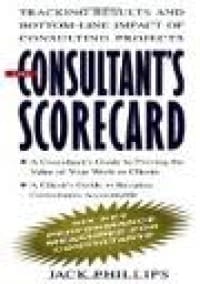New Book Review: "The Consultant's Scorecard"
New book review for The Consultant's Scorecard: Tracking Results and Bottom-Line Impact of Consulting Projects, by Jack Phillips, McGraw-Hill, 1999:


It is quite surprising that more reviews have not been written about this text by Phillips, because it is seemingly rather difficult to find other works that directly address the bottom line impact of consulting (especially outside the training space).
Before acquiring a copy of this book, be aware that the content is rather substantive, reaching nearly 400 pages. Although much more math was expected, the author's argument that complex formulas for return on investment (ROI) are really not needed made sense after reading chapter 8, which begins by discussing the viewpoint that "the phrase return on investment in consulting is occasionally misused – sometimes intentionally. In these situations, a very broad definition for ROI is offered to include any benefit of the consulting intervention. ROI is thus defined as a vague concept in which even subjective data linked to a program are included. In this book, return on investment is used more precisely and is meant to represent an actual value arrived at by comparing consulting costs to benefits. The two most common measures are the benefit-cost ratio and the ROI formula. Both of these are presented, along with other approaches to calculate the return or payback. For many years, consultants sought to calculate return on investment for consulting interventions. If a consulting intervention is considered an investment and not an expense, then it is appropriate to place consulting in the same funding category as other investments, such as those in equipment and facilities. Although the other investments are quite different, they are often viewed by management in the same way. Thus, it is critical to the success of the consulting intervention to develop specific values that reflect the return on the investment".
The lack of complexity is a strength of the process presented, and offered a reminder of a comment made recently by Warren Buffet on Squawk Box (CNBC) that the investor needs to be wary of stock picks based on complicated formulas (i.e. developed by quants). However, there is much more to "The Consultant's Scorecard" than ROI calculation, the subject of which consumes a small portion of the content. Presented are 6 different measures collected in a consulting intervention that present a balanced viewpoint of the success of the consulting project and involve both qualitative and quantitative data collected at different time intervals: (1) reaction and satisfaction, (2) skill and knowledge changes, (3) implementation, application, and utilization, (4) business impact data, (5) financial payoff, and (6) non-financial intangible measures.
As Phillips states, "the ROI process [presented here] is not for every organization or individual consultant. The use of the ROI process represents a tremendous paradigm shift as an organization attempts to bring more accountability and results to the consulting process. It is client focused, requiring much contact, communication, dialog, and agreement with the client". However, the opinion of this reviewer as a software engineering consultant is that portions of this process might be utilized as needed, as long as these are taken in context, just as any other modern methodology. Although this reviewer has been known to state to colleagues that everyone uses a process, regardless of formality, since process is really just a way of doing things, because showing the bottom line impact of consulting does involve considerable client involvement, core aspects of this process are expected to be needed to remain in place.
This book is well recommended to both consultants and clients, and if the potential reader exists in either of these audiences and does not value ROI, the 14 myths of ROI presented in the introduction to this work are recommended minimum reading.